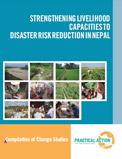Report
Strengthening livelihood capacities to disaster risk reduction in Nepal

This book documents the lessons learned during the Livelihood Centred Approaches to Disaster Risk Reduction project in the Chitwan and Nawalparasi districts of Nepal. It describes the prevailing physical, institutional and socio-economic context, and details the activities and its interventions.
The book is a compilation of initiatives and their evaluated outcomes on improved and diversified livelihood strategies including the adoption of new income earning opportunities which has increased incomes and food security, and improved health and resilience of targeted communities while reducing their exposure to prevailing and future hazards.
Practical Action, 2015.
